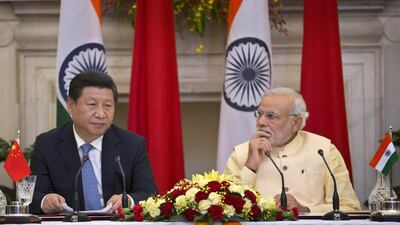Donald Trump's apocalyptic threats against North Korea have attracted much international attention but not China's unceasing warmongering against India. As the face-off between Indian and Chinese troops on the small, desolate Doklam Plateau drags on, Beijing continues its sabre-rattling against India.
The rising Himalayan border tensions have been underscored by an August 15 clash elsewhere in which several Indian and Chinese soldiers were wounded, not by gunfire but by rock throwing.
Xi Jinping, China's president, has sought to present himself as the voice of reason by calling for US restraint on North Korea, even as his regime has issued threats to India. The American press has published Mr Xi's call for dialogue and negotiations to find a diplomatic solution to the North Korea issue without citing his opposition to similarly settle the Doklam impasse.
In reality, Mr Xi faces a frustrating paradox: He is seeking to avert a military conflict over the potential threats posed by North Korea's nuclear and missile advances just as he is searching for a way to punish India, including potentially employing force.
________________
Read more:
North Korea crisis: is there method in Trump's madness?
India, China troops clash in high-altitude disputed territory
India will fight foreign threats, Modi vows
________________
By standing up to Beijing in the face of harsh warmongering, India has challenged China's reputed pre-eminence at a time when Mr Xi is busy with his own domestic political machinations in the run-up to the critical Communist Party congress in the autumn. India has stood its ground at Doklam, a 3,350-metre-high plateau along the border that Bhutan and Tibet share with the Indian state of Sikkim. Narendra Modi, India's prime minister, has declared his country is "capable of thwarting any challenge to its security."
China has threatened to teach a bigger lesson to India than it did in 1962 when it carried out a surprise trans-Himalayan invasion just as the Cuban missile crisis had raised the spectre of a nuclear conflict. China’s hostility towards India is occurring at a time when another missile crisis is haunting international security.
China is central today to the US strategy against North Korea. A US military conflict with North Korea, Beijing's estranged ally, could easily draw in China.
Trump’s threat to rain “fire and fury” on the regime in Pyongyang, along with other statements from US officials about the possibility of war, has unnerved Beijing, despite Washington subsequently seeking to ease fears. This factor could be one of the reasons why China, even at the risk of being all bark and no bite, has thus far not acted on its unremitting threats to teach India a lesson.
India, however, cannot afford to be complacent. New Delhi cannot overlook the fact that Mr Xi’s regime has been mobilizing domestic support for a possible war with India, which it has painted as the aggressor, while claiming China to be the aggrieved party.
For example, after weeks of escalating war rhetoric, China released a 15-page position paper on August 2 that accused India of "invading Chinese territory." It came a day after Mr Xi, in a speech marking the 80th anniversary of the founding of the People's Liberation Army, vowed not to permit the loss of "any piece" of Chinese land "at any time or in any form."
More significantly, the standoff has highlighted how China is implementing its new three-pronged doctrine against India, waging media, legal and psychological warfare to "win without fighting," and, in case it fails, to prepare the ground for military operations. A 2008 Pentagon report to Congress said China's doctrine was being "developed for use in conjunction with other military and non-military operations."
________________
More from Opinion:
Iran is closely watching the US-North Korea stand-off
Why the North Korea crisis has serious implications for the Middle East
As the North Korean crisis deepens, Trump upends the nuclear calculus
________________
In Beijing’s thinking, according to a subsequent Pentagon report in 2014, “it is not the best weapons that win today’s wars but rather the best narrative”, even if it is a false narrative. On the Doklam issue, as it has done in the South and East China seas, China is operating on the Orwellian principle that “if you say it enough, they will believe it.”
A fusillade of fresh warnings to India to back down or face dire consequences has been delivered this month by the Chinese defence and foreign ministries and other state mouthpieces. As a former PLA general has acknowledged, “such strong response from the Chinese government has been rare.”
If the probability of a military conflict over North Korea’s actions recedes, would the risk of a Chinese military attack on India increase? Mr Xi has sought to reduce tensions over North Korea by banning imports of North Korean iron, lead and coal and promising other steps to rein in Pyongyang.
However, there are other factors that Mr Xi must consider, including a shaky Chinese economy, hot-money outflows, the forthcoming party congress, and the September 3-5 summit of the Brics grouping in China. Unless the Himalayan border situation deteriorates, Mr Modi will likely be at the summit.
China’s modus operandi to alter the territorial and maritime status quo in Asia has been to wage stealth wars. Doklam would represent a turning point if China’s bullet-less aggression of the past decade in Asia escalates to a shooting war with India.
Deception, tactical surprise, shrewd timing and lightning conflict have been the common elements in China’s use of military force under communist rule. The goal in all cases has been to stun the enemy and make quick military and political gains.
China cannot count on all these elements today. India, for its part, cannot afford to take any major risk. Only an India fully prepared to counter and defeat aggression can deter China from initiating a military conflict.
Brahma Chellaney is a geostrategist and the author of nine books


